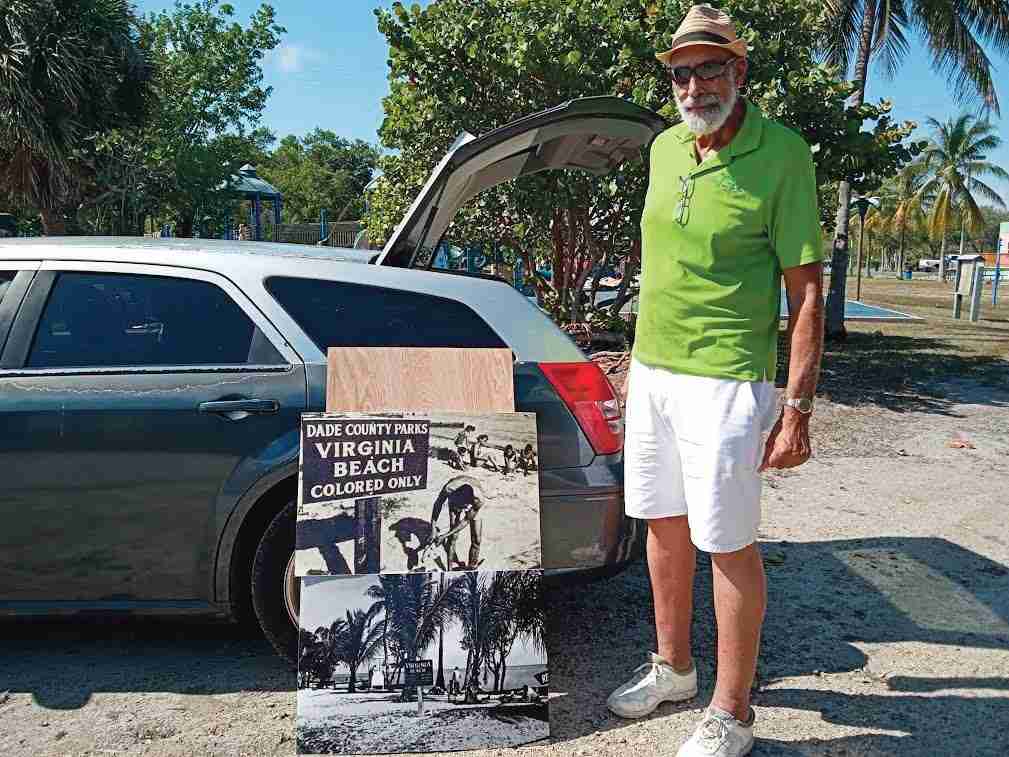Miami – The opposition for Miami City Commissioners’ decision to oust the previous Virginia Key Beach Park Trust last month and replace the board with themselves is not going away easily.
More than 100 people gathered this past Saturday in a peaceful demonstration at the historic site of Miami’s only Colored Beach to protest the takeover and plan to urge city leaders at their next meeting to restore the previous Trust.
The Wade in the Water event brought generations of people together to celebrate the history of Virginia Key Beach and also honor Black trailblazers who made the only Colored beach possible including Miami’s first Black Commissioner Athalie Range and military veterans.
The event, which was sponsored by the Sierra Club in conjunction with the NAACP, also paid tribute to military veterans on Veterans Day weekend who also played a role in opening the beach for Blacks during segregation.
The takeover left the Black community and Virginia Key Beach restoration advocates disappointed and miffed over replacing the all-Black Trust with four Cuban-Americans commissioners, one White commissioner and one Black commissioner who all will oversee the restoration projects and the construction of a Black museum.
At issue were accusations of the previous Trust mishandling money following an audit and a nearly two-decade delay to build a Black museum on Miami’s only Colored Beach.
Founded in the 1990s, the Trust was charged with restoring and reopening the beach and building the facility after the city of Miami shut down the beach in 1982 due to the costs of maintenance and operations.
The Trust raised money for restoration projects and sought financial help from the city and Miami-Dade County.
But funding proposals between the city and county for the museum fizzled over the years, said Gene Tinnie, a professional artist and community activist who founded the trust.
This past weekend, about 100 people conducted a peaceful demonstration at Virginia Key Beach and encouraged each other to urge the commissioners to restore the previous trust.
He said the previous Trust was the scapegoat for the funding disagreements that stymied the construction of the museum since the 2000s.
“The city had to commit to maintain the museum once it’s built and other issues,” Tinnie said during the event on Saturday. “I think the city was reluctant to do some of the things in the proposed agreements.”
Tinnie said it’s vital to preserve the rich history of Blacks during the segregation struggle and efforts to open the beach for African-Africans for future generations.
He said after World War II, Black soldiers were greeted with hostility and discrimination while their counterparts, White soliders, received a hero’s welcome.
He said Black soldiers were also part of the movement to open Miami’s only Colored Beach Miami after they returned to civilian life.
Tinnie said three sailors who fought in the war stood on the front lines to protest segregation that prohibited Blacks from swimming on Miami Beach and other White beaches in South Florida.
“They risked being arrested,” he said. “Black servicemen want to come back home to something better but they weren’t allowed at the beaches. The vets were very much part of the movement to get Miami’s only Colored Beach.”
Tinnie said he was disappointed when city commissioners took over the Trust, with a majority of them being Cuban-Americans, who and their ancestors never experienced the struggles and tragedies Blacks endured during segregation, which led to the opening of the beach.
“We have to return it to community control,” he said. “It’s people there who don’t know our history and culture that are very important to Black community and for me to be here.”
Tinnie said despite a physical museum not built on the historic landmark, people can get a taste of the spirit of what Miami’s only Colored Beach was like during segregation.
Visitors can see decrepit signs and old pictures around the beach park and picnic areas including Blacks who spearheaded efforts to get the beach open for African-Americans.
“It’s a sacred site for our peoples’ stories, struggles and tragedies,” he said. “It’s an extraordinary place that was people’s paradise like the Bahamas Islands. It’s also an opportunity for people to connect with nature, which is so inspiring to everyone. That’s how much this beach park means to us.”
During Saturday’s event, participants got a taste of some soul food, listened to stories about the history of the beach, and kids and adults rode carnival rides and competed in group games.
Steven Leidner, conservative chairman for the Sierra Club, said his organization is showing solidarity with the Black community over the takeover.
He said he hopes the peaceful demonstration convinces city commissioners to return the Trust to community control.
Leidner said he spoke against the proposal for the Trust take over at commissioners’ meeting last month. “It made my blood boil,” he said. “With little discussion among themselves, the vote to oust the Trust members is unacceptable. Commissioners need to hear more of the outrage from the constituents because this is not going away easily.”
Leidner said legal action may be taken over the decision to oust the Trust.
“There’s a possibility of some legal remedies from my view,” he said.
Dwight Bullard, president of the South Dade branch of the NAACP, said the organization is sending a clear message to city commissioners with the peaceful demonstration.
“Keep the Virginia Key Beach Park Trust as it is,” he said. “We want to make sure the efforts to place a museum on the historic site and the environmental integrity of the space are kept.”










No Comment